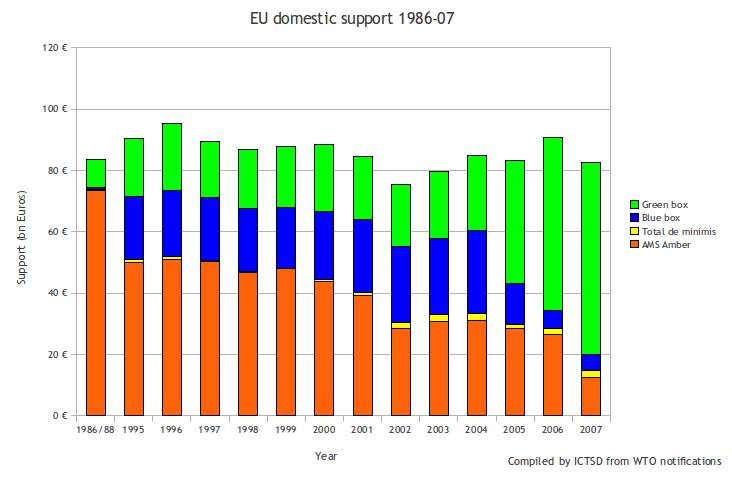According to the EU’s recent notification of farm subsidies to the WTO for the marketing year 2007/08, the EU’s trade distorting farm subsidies fell to a record low of 12.3 billion euros.
As the ICTSD reports,
“For the first time ever, the recent figures would put the EU’s overall trade-distorting support below the proposed new ceiling of 22 billion euros that would be established by a Doha Round accord under the terms currently being considered at the WTO. The Doha deal would create a new subsidy cap that limits the total amount of amber, blue and de minimis support that countries are allowed to provide.”
In other words, on the basis of the notification for 2007/08 (the most up to date that the EU has made), a Doha deal would not require the EU to change any of its farm subsidy policies. This comes as little surprise since the EU wave the magic wand of decoupling and ensured that most of the money it pays farmers is theoretically ‘non trade distorting’ and therefore unaffected by WTO disciplines.*
The EU’s notification data indicates that non production-linked support hit a record high of 62.6 billion euros in 2007/08. Add that to the 12.3 billion euros of production-linked (amber box) support, 5.17 billion euros of production-limiting (blue box) support and 2.39 billion euros of ‘de minimis’ support, the grand total is 82.5 billion euros of aid in a single year – quite a sum to have spent supporting agriculture, particularly in a year that saw commodity prices hit record highs. The graph below, compiled by ICTSD, shows the trend over the past decades.
* It’s worth remembering that a Doha deal would have implications for some of the EU’s tariffs on food imports and this would likely to have an impact on the more heavily tariff-protected sectors such as beef, sugar beet and dairy, though a great deal of that depends on the extent of the exemptions granted for ‘sensitive products’.


